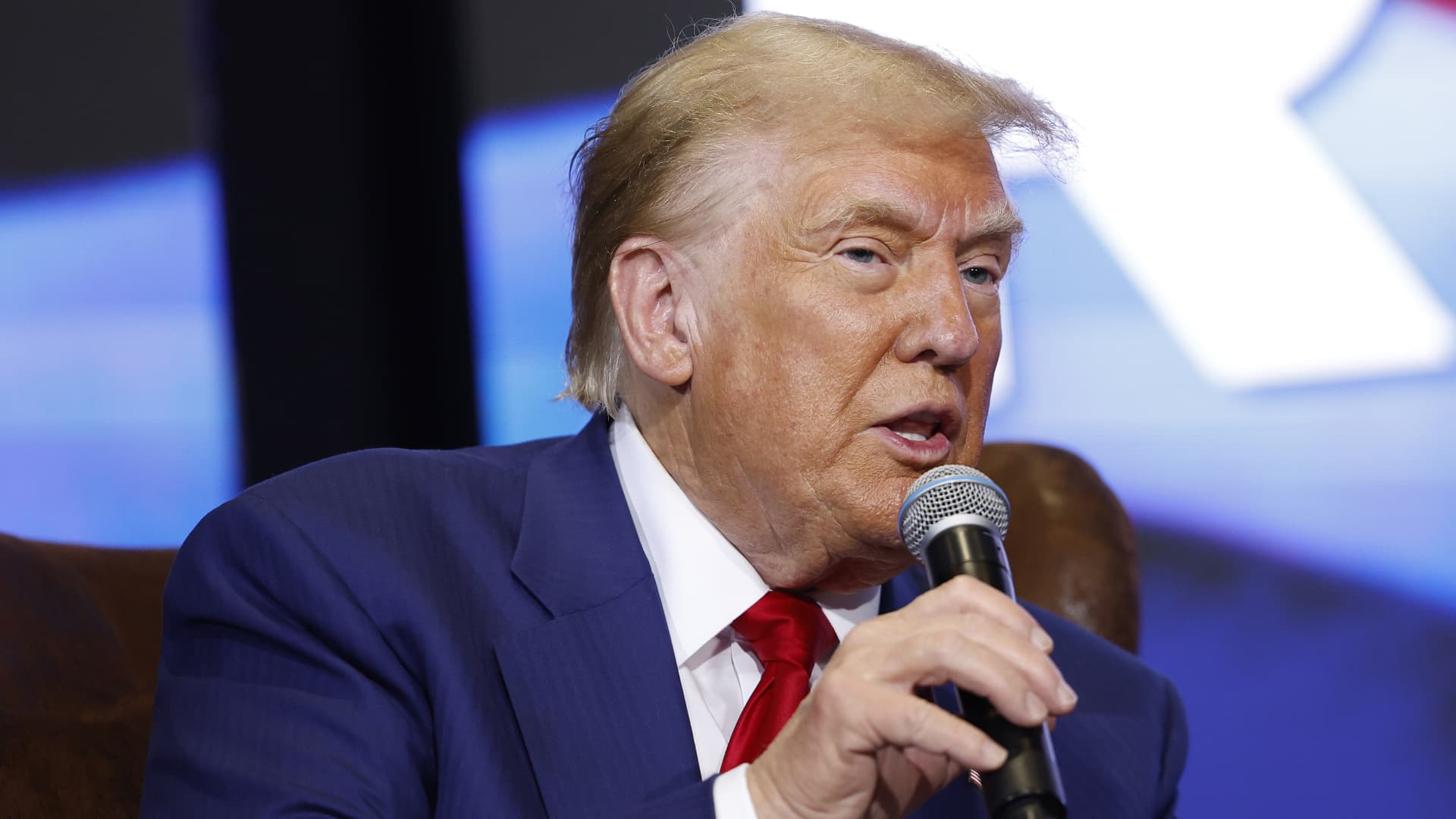Analyzing Trump's Claim: Could Tariffs Replace Income Taxes?

Table of Contents
The Mechanics of a Tariff-Based System
Implementing a system where tariffs become the primary source of government revenue presents significant logistical and economic challenges. Let's examine the practicalities.
How Tariffs Generate Revenue
Tariffs, essentially taxes on imported goods, generate revenue based on the volume of imports and the applied tariff rates. Higher import volumes and higher tariff rates translate to increased government revenue. However, several factors limit this revenue stream:
- Elasticity of Demand: If tariffs significantly increase prices, consumers may reduce their demand for imported goods, lowering tariff revenue.
- Trade Diversion: Tariffs might encourage domestic production but could also lead to shifting imports from one country to another with lower tariffs, reducing overall revenue.
- Tariff Avoidance: Businesses might seek ways to circumvent tariffs, such as through mislabeling or using alternative supply chains.
- Examples: While some countries historically relied heavily on tariffs, their success varied greatly. The US in the early 19th century, for example, generated substantial revenue from tariffs, but its effectiveness was limited by smuggling and fluctuating trade patterns.
Distribution of Tariff Revenue
Even if substantial revenue were generated, distributing it equitably is a major hurdle. Unlike progressive income taxes, which generally tax higher earners at higher rates, tariffs are inherently regressive. They disproportionately affect lower-income households who spend a larger percentage of their income on imported goods.
- Scenario 1: A flat distribution would exacerbate income inequality.
- Scenario 2: Targeting specific goods with tariffs to partially offset regressive impacts would be extremely complex and politically challenging.
- Fairness Concerns: The burden of a tariff-based system would fall most heavily on consumers of imported goods, not necessarily on the wealthiest individuals.
Administrative Challenges
Administering a tariff-based system presents immense challenges compared to collecting income taxes:
- Increased Bureaucracy: Tracking imports, calculating tariffs, and collecting revenue requires a vast and complex bureaucratic apparatus.
- Potential for Corruption: The intricate system creates opportunities for corruption and mismanagement.
- Complexity: Accurately tracking imports and exports, especially in the face of globalized supply chains and e-commerce, is a significant logistical undertaking.
Economic Impacts of a Tariff-Based System
Replacing income taxes with tariffs would have profound and potentially devastating economic consequences.
Impact on Consumers and Businesses
Significantly increased tariffs translate directly into higher prices for consumers. This leads to:
- Inflationary Pressures: Increased prices for imported goods drive up overall inflation, eroding purchasing power.
- Reduced Consumer Spending: Higher prices curb consumer spending, potentially triggering an economic downturn.
- Trade Wars: Retaliatory tariffs from other countries could further damage the economy.
Impact on Government Revenue
Relying solely on tariffs for government revenue is incredibly risky:
- Volatility: Tariff revenue is highly volatile, subject to fluctuations in global trade and economic conditions.
- Examples: Countries heavily reliant on tariffs have historically faced periods of severe financial instability when trade declines.
- Unpredictability: Accurate revenue projections are near impossible given the complex interplay of global economic factors.
Impact on Global Trade Relations
A radical shift to a tariff-based system would severely disrupt international trade relations:
- WTO Rules: Such a drastic change would likely violate World Trade Organization rules, leading to potential trade sanctions.
- Retaliatory Measures: Other countries would almost certainly retaliate with their own tariffs, triggering trade wars.
- Supply Chain Disruptions: Global supply chains would be severely disrupted, impacting businesses and consumers worldwide.
Comparing Tariffs and Income Taxes: A Critical Analysis
A direct comparison highlights the fundamental differences and inherent flaws in replacing income taxes with tariffs.
Progressive vs. Regressive Taxation
Income taxes are generally progressive, meaning higher earners pay a larger percentage of their income in taxes. Tariffs are fundamentally regressive, impacting low-income households disproportionately.
- Impact on Low-Income Households: Low-income individuals spend a larger percentage of their income on imported goods, making them particularly vulnerable to tariff increases.
- Distribution of Tax Burden: The tax burden under a tariff system would be unevenly distributed, exacerbating income inequality.
Equity and Fairness
Replacing a progressive income tax system with a regressive tariff-based system would be fundamentally unfair and inequitable.
- Social Impact: Increased inequality could lead to social unrest and political instability.
- Income Inequality: The regressive nature of tariffs would worsen existing income inequality.
Economic Efficiency
Income taxes, while imperfect, generally have less distortionary effects on the economy compared to tariffs.
- Market Distortions: Tariffs distort market mechanisms, leading to inefficient resource allocation.
- Deadweight Loss: Tariffs create deadweight losses, reducing overall economic output.
Analyzing Trump's Claim: Could Tariffs Replace Income Taxes? – A Final Verdict
Our analysis reveals that replacing income taxes with tariffs is highly impractical and economically damaging. While tariffs can generate revenue, their inherent regressiveness, volatility, and potential for disrupting global trade far outweigh any perceived benefits. The administrative challenges are immense, and the economic consequences could be devastating. The proposal is ultimately unrealistic and unsustainable.
Therefore, the answer to the question "Could tariffs replace income taxes?" is a resounding no. The economic and social ramifications would be too severe to justify such a radical and ill-conceived policy.
To further explore the debate surrounding tariffs replacing income taxes, we encourage you to research the economic impacts of protectionist policies and the principles of taxation. Understanding the implications of replacing income tax with tariffs is crucial for informed civic participation.

Featured Posts
-
 When Is Kamala Harris Planning Her Political Re Entry
Apr 30, 2025
When Is Kamala Harris Planning Her Political Re Entry
Apr 30, 2025 -
 Eleven Years Since The Louisville Tornado Reflections And Recovery
Apr 30, 2025
Eleven Years Since The Louisville Tornado Reflections And Recovery
Apr 30, 2025 -
 Kansas City Royals Win Thriller Garcias Blast And Witts Double Secure Victory
Apr 30, 2025
Kansas City Royals Win Thriller Garcias Blast And Witts Double Secure Victory
Apr 30, 2025 -
 Noa Argamani Among Times 100 Most Influential People Of 2025
Apr 30, 2025
Noa Argamani Among Times 100 Most Influential People Of 2025
Apr 30, 2025 -
 Vorombe Krupneyshie Ptitsy V Istorii Evolyutsiya I Vymiranie
Apr 30, 2025
Vorombe Krupneyshie Ptitsy V Istorii Evolyutsiya I Vymiranie
Apr 30, 2025
